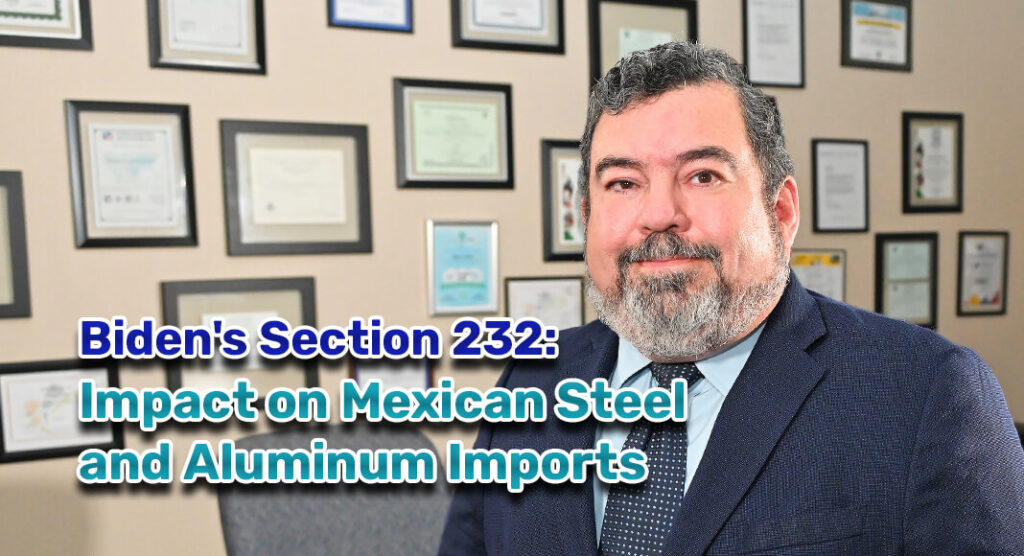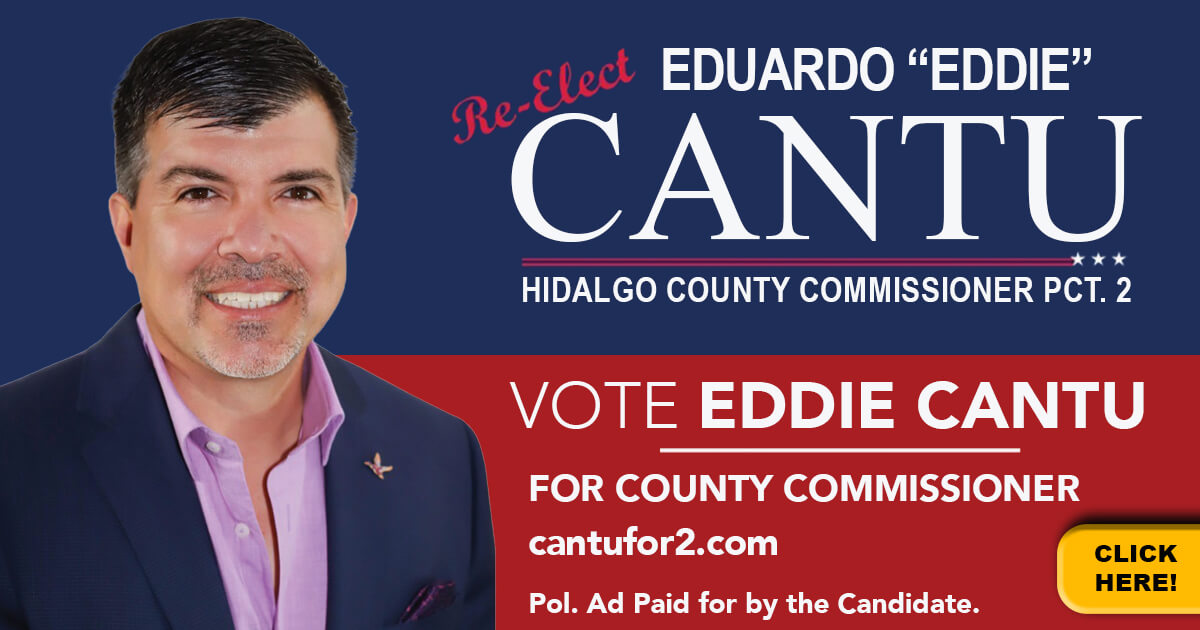
Texas Border Business
By Roberto Hugo González
In a recent Courtesy Talk organized at the request of the Maquiladora industry in Mexico, Jorge Torres, President and owner of Interlink Trade Services Custom Brokers, addressed the implications of the US Section 232 tariffs on steel and aluminum products from Mexico. The talk highlighted two new presidential proclamations issued by President Biden on July 10th, mandating that certain steel and aluminum articles imported from Mexico are subject to additional tariffs—25% for steel and 10% for aluminum, with the rate for Russian aluminum increasing to 200%.
“The condition for exemption from these tariffs is quite specific,” explained Torres. “For steel, the raw material utilized to make the steel products must be melted and poured in Mexico, the US, or Canada. If the steel is melted and poured in other countries, it will incur a 25% tariff. Similarly, the raw material utilized to make aluminum products must not be melted and cast in the following countries: China, Iran, Belarus, and Russia. Aluminum products made from raw material melted and cast in these countries will incur a 10% tariff (with Russia being subject to a 200% tariff due to the ongoing conflict in Ukraine).
According to Torres, the announcement caused considerable confusion and concern within the industry. Many feared that all products containing aluminum or steel would be affected. However, the tariffs apply only to a specific list of products and tariff codes, the same list outlined in President Trump’s 2018 proclamation under Section 232 of the Trade Expansion Act of 1962. This act empowers the executive branch to impose tariffs if certain imports are deemed a threat to national security.
Torres elaborated on the investigative process: “The president directs the Department of Commerce to investigate and report back on whether these imports pose a national security threat. Based on their findings, the president can impose the necessary tariffs. President Trump initially carried out this process in 2018 and reiterated by President Biden.”
The exemption for Mexico, initially granted, has now been tightened due to concerns over Mexico being used as a conduit for Chinese aluminum and steel. The US government had repeatedly warned Mexico about these practices, leading to the current reinforcement of tariffs unless the steel and aluminum meet the specified conditions.
In response, Mexico has implemented measures such as “Avisos Automáticos” (automatic notices) for certain steel products, requiring the submission of mill certificates to indicate the origin of the steel. Mexico also increased tariffs on certain commodities, including aluminum and steel, in April to align with US demands and monitor these materials’ importation more effectively.
Torres pointed out the economic dynamics at play: “China, with its overcapacity issues, floods the market with cheap steel and aluminum. This has significant implications for international trade, leading to measures like Section 232 to prevent the circumvention of tariffs and protect national security.”
While the tariffs themselves are not new, their enforcement has been reinforced. Mexico must now comply with the conditions regarding where the steel and aluminum are melted, poured, and cast to maintain its exemption from the 25% and 10% tariffs, respectively.
“The mill, analysis, and origin certifications are crucial,” emphasized Torres. “Customs and Border Protection (CBP) will enforce this requirement, ensuring importers provide proof and sufficient evidence that the steel and aluminum meet the necessary conditions. This compliance is monitored electronically, with import specialists reviewing and auditing the documentation to validate the claims.”
The sophisticated nature of these enforcement measures ensures thorough compliance. Electronic verification processes handle import transactions, while customs officers at the border focus on ensuring trade flows smoothly and preventing illegal merchandise from entering. Duties, tariff classifications, and values are scrutinized post-entry by import specialists who audit transactions to ensure they meet legal requirements.
In summary, the recent reinforcement of Section 232 tariffs highlights the US’s commitment to protecting its national security and economic interests by ensuring that imported steel and aluminum meet stringent sourcing criteria. Mexico’s compliance with these measures is crucial to maintaining its tariff exemptions and fostering transparent trade practices between the two nations.
As President and owner of Interlink Trade Services Custom Brokers, Torres provided insightful commentary during this recent Courtesy Talk, addressing concerns and clarifying details for the audience.
Reflecting on the reception of the information shared, Torres noted, “Yes, actually, we had about 115 people from all over the country, mainly Mexico and a few from the US. And yes, I received several compliments, which I appreciate. They appreciated how we explained this in terms that people could understand because there was a lot of confusion about all the products.”
The clarity provided was crucial, particularly for executives in the Maquiladora industry who deal with steel and aluminum products. “Can you imagine a VP of a maquiladora that makes steel and aluminum products or uses steel and aluminum components? They were going crazy. They were very concerned. So at least we could explain the scope of the products and the conditions,” Torres explained. He emphasized that certain products and tariff codes fall under Section 232, and businesses must understand these specifics to avoid unnecessary tariffs.
Torres provided examples to clarify these points further. “We have customers that make aluminum extrusions in Mexico, and those tariff codes are on the list for Section 232. Still, they use aluminum from countries such as Qatar and other countries subject to the exemption. So, they’re still able not to have that 10% tariff. We explained that, and the same thing with steel. We’re using steel that is melted and poured in the US. So, we’re fine. We don’t have to pay. We clarified those things.”
The next significant challenge is ensuring compliance with the new documentation requirements from US Customs and Border Protection (CBP). “Right now, we already have a system of import licenses where we mention where the steel is melted and poured and where the aluminum is melted and cast. We are already doing that electronically,” Torres stated. However, he noted that additional documentation, such as mill certificates and certificates of analysis, might be required, pending further guidance from CBP.
Addressing potential delays in trade processing due to these new restrictions, Torres was cautiously optimistic. “From a transactional standpoint, I don’t think shipments will be delayed unless the exporter or importer does not have the information available. If they cannot tell us where the steel was melted and poured or don’t have the required documentation, that’s when things can get complicated, and delays can occur.”
The proactive approach to communication and education is vital. “I’m going to give this talk in Reynosa to the Maquiladora Reynosa INDEX import-export committee at their monthly meeting. I will explain this again to them in more detail because they’re the ones that are going to execute this.”
Flor Torres, the director of CIC (Competitive Industrial Center), also played a crucial role in the Courtesy Talk. Jorge Torres mentioned, “She helped me organize the event and participated in explaining the Mexican side of things, such as Avisos Automáticos and other relevant details.”
In concluding remarks, Torres highlighted the financial implications for companies. “For companies that will be impacted by this, ensure that they comply and quantify, put the money aside because this is already in effect. You should already be paying this if you’re not within the exemptions. There will be a financial impact, and companies must do an internal analysis to ensure compliance.”
The retroactive nature of the tariffs, effective from July 10th, adds urgency to the matter. “If companies do not pay this starting July 10th, they will have to pay it if exposed,” Torres warned. He stressed the importance of continuous evaluation, especially when changing suppliers, to avoid unintended tariff liabilities.
Looking ahead, Torres suggested that the situation might drive the development of more smelters in North America. “A solution will be to have more smelters in North America. Many of the smelters use scrap. So, bring scrap metal into the US, Mexico, and Canada, melt it, and do whatever you need to make the steel aluminum in North America. This will force companies to look at installing smelters in the US, Mexico, and Canada.”
The reinforcement of Section 232 tariffs stresses the US’s commitment to protecting national security and economic interests. The ripple effects of these measures will likely prompt significant adjustments within the industry, fostering closer scrutiny of supply chains and potentially reshaping the landscape of North American trade.














